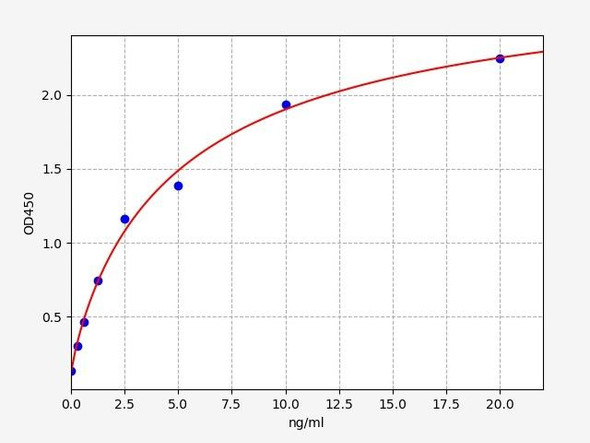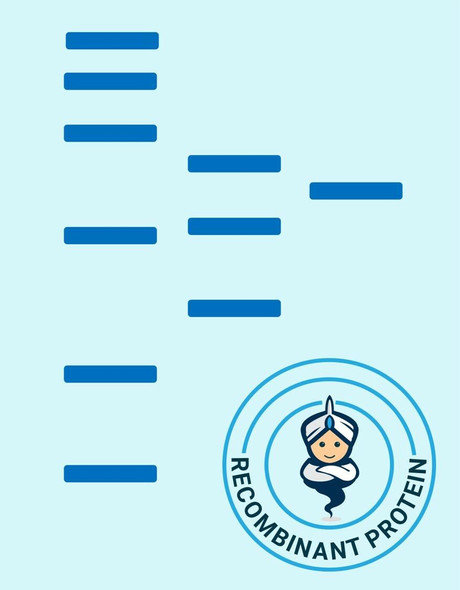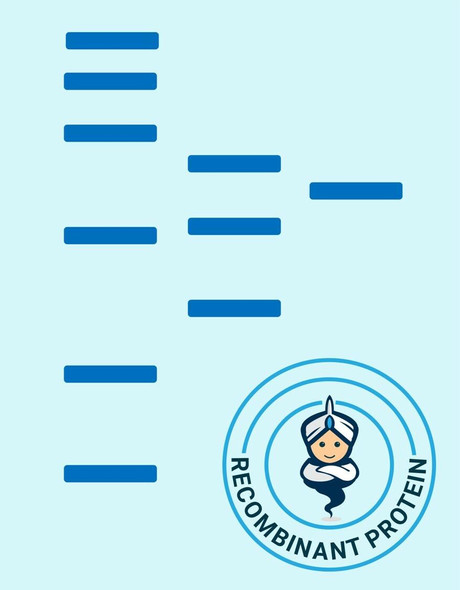Human PDCD4 Recombinant Protein (RPPB4209)
- SKU:
- RPPB4209
- Product type:
- Recombinant Protein
- Size:
- 10ug
- Species:
- Human
- Target:
- PDCD4
- Synonyms:
- Programmed cell death protein 4
- Nuclear antigen H731-like
- Neoplastic transformation inhibitor protein
- Protein 197/15a
- Source:
- Escherichia Coli
- Uniprot:
- Q53EL6
Description
| Product Name: | Human PDCD4 Recombinant Protein |
| Product Code: | RPPB4209 |
| Size: | 10µg |
| Species: | Human |
| Target: | PDCD4 |
| Synonyms: | Programmed cell death protein 4, Nuclear antigen H731-like, Neoplastic transformation inhibitor protein, Protein 197/15a, PDCD4, H731, MGC33046, MGC33047. |
| Source: | Escherichia Coli |
| Physical Appearance: | Sterile Filtered colorless solution. |
| Formulation: | The protein solution contains 20mM Tris-HCl pH-8, 1mM DTT and 0.1M sodium chloride. |
| Stability: | Store at 4°C if entire vial will be used within 2-4 weeks. Store, frozen at -20°C for longer periods of time. For long term storage it is recommended to add a carrier protein (0.1% HSA or BSA).Avoid multiple freeze-thaw cycles. |
| Purity: | Greater than 90.0% as determined by:(a) Analysis by RP-HPLC.(b) Analysis by SDS-PAGE. |
| Amino Acid Sequence: | MDVENEQILN VNPADPDNLS DSLFSGDEEN AGTEEIKNEI NGNWISAYSI NEARINAKAK RRLRKNSSRD SGRGDSVSDS GSDALRSGLT VPTSPKGRLL DRRSRSGKGR GLPKKGGAGG KGVWGTPGQV YDVEEVDVKD PNYDDDQENC VYETVVLPLD ERAFEKTLTP IIQEYFEHGD TNEVAEMLRD LNLGEMKSGV PVLAVSLALE GKASHREMTS KLLSDLCGTV MSTTDVEKSF DKLLKDLPEL ALDTPRAPQL VGQFIARAVG DGILCNTYID SYKGTVDCVQ ARAALDKATV LLSMSKGGKR KDSVWGSGGG QQSVNHLVKE IDMLLKEYLL SGDISEAEHC LKELEVPHFH HELVYEAIIM VLESTGESTF KMILDLLKSL WKSSTITVDQ MKRGYERIYN EIPDINLDVP HSYSVLERFV EECFQAGIIS KQLRDLCPSR GRKRFVSEGD GGRLKPESY |
PDCD4 is restricted to the nucleus in proliferating cells. Expression of PDCD4 is modulated by cytokines in natural killer and T cells. PDCD4 takes part in apoptosis. PDCD4 is a translation inhibitor targeted for degradation during tumor promotion. PDCD4 promotes colonic neoplastic transformation and tumor invasion. PDCD4 is an important target for microrna R-21 in breast cancer cells. Shortage of PDCD4 expression is associated with colorectal cancer. PDCD4 is swiftly phosphorylated by S6K1 kinase protein & afterwords degraded by ubiquitin ligase SCF in response to mitogens. PDCD4 in response to mitogens allows competent protein synthesis & cell growth. PDCD4 is a proapoptotic protein involved in TGF-beta1-induced apoptosis in human HCC cells, and a tumor suppressor in hepatocarcinogenesis. PDCD4 restraines tumor progression in colon carcinoma cells by the novel mechanism of down-regulating MAP4K1 transcription, with consequent inhibition of c-Jun activation and AP-1-dependent transcription. Overexpression of PDCD4 in carcinoid cells results in inhibition of cell proliferation.
PDCD4 Human Recombinant produced in E.Coli is a single, non-glycosylated polypeptide chain containing 469 amino acids and having a molecular mass of 51 kDa.
| UniProt Protein Function: | PDCD4: protein localized to the nucleus in proliferating cells that seems to possess a tumor suppressor activity. Directly interacts with the RNA helicase eIF4A and inhibits protein synthesis by interfering with the assembly of the cap-dependent translation initiation complex. Suppresses carbonic anhydrase type II protein expression in carcinoid cell lines. Since tumor cells require a high bicarbonate flux for their growth, carbonic anhydrase suppression results in growth inhibition. Expression of this gene is modulated by cytokines in natural killer and T cells. The gene product is thought to play a role in apoptosis but the specific role has not yet been determined. Two differentially spliced isoforms have been identified. |
| UniProt Protein Details: | Protein type:Tumor suppressor; Apoptosis Chromosomal Location of Human Ortholog: 10q24 Cellular Component: cytoplasm; cytosol; nucleoplasm; nucleus Molecular Function:protein binding; RNA binding Biological Process: apoptosis; cell aging; negative regulation of apoptosis; negative regulation of cell cycle; negative regulation of JNK activity; negative regulation of transcription, DNA-dependent |
| NCBI Summary: | This gene is a tumor suppressor and encodes a protein that binds to the eukaryotic translation initiation factor 4A1 and inhibits its function by preventing RNA binding. Alternative splicing results in multiple transcript variants. [provided by RefSeq, Dec 2010] |
| UniProt Code: | Q53EL6 |
| NCBI GenInfo Identifier: | 317373317 |
| NCBI Gene ID: | 27250 |
| NCBI Accession: | Q53EL6.2 |
| UniProt Secondary Accession: | Q53EL6,O15501, Q5VZS6, Q6PJI5, Q8TAR5, Q99834, B2RCV4 B5ME91, |
| UniProt Related Accession: | Q53EL6 |
| Molecular Weight: | 50,576 Da |
| NCBI Full Name: | Programmed cell death protein 4 |
| NCBI Synonym Full Names: | programmed cell death 4 (neoplastic transformation inhibitor) |
| NCBI Official Symbol: | PDCD4 |
| NCBI Official Synonym Symbols: | H731 |
| NCBI Protein Information: | programmed cell death protein 4 |
| UniProt Protein Name: | Programmed cell death protein 4 |
| UniProt Synonym Protein Names: | Neoplastic transformation inhibitor protein; Nuclear antigen H731-like; Protein 197/15a |
| Protein Family: | Programmed cell death protein |
| UniProt Gene Name: | PDCD4 |
| UniProt Entry Name: | PDCD4_HUMAN |










